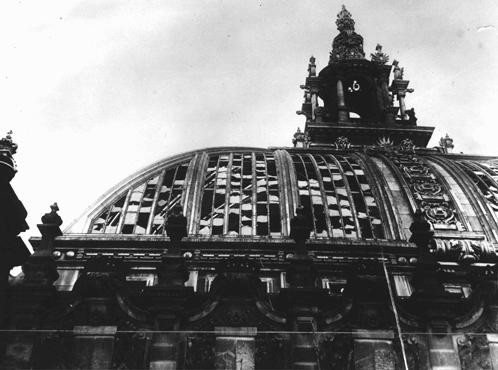
Reichstag Fire Decree
The Decree of the Reich President for the Protection of the People and the State was one of a series of key decrees, legislative acts, and case law in the gradual process by which the Nazi leadership moved Germany from a democracy to a dictatorship.
Background
The Decree of the Reich President for the Protection of the People and the State is also known as the Reichstag Fire Decree. It was passed on February 28, 1933.
On February 27, 1933, 24-year-old Dutch militant Marinus van der Lubbe set fire to the German parliament (Reichstag), causing extensive damage to the building that had long been the symbol of German unity. The government falsely portrayed the incident as part of a Communist plot to overthrow the state in response to Adolf Hitler's appointment as Reich Chancellor by President Paul von Hindenburg on January 30, 1933.
On February 4, Hitler's cabinet had restricted the press and authorized the police to ban political meetings and marches. Nazi leaders then exploited the Reichstag fire to gain President von Hindenburg's approval for a more extreme measure called the Decree for the Protection of the People and the State.
Popularly known as the Reichstag Fire Decree, the regulations suspended important provisions of the German constitution, especially those safeguarding individual rights and due process of law. The decree permitted the restriction of the right to assembly, freedom of speech, and freedom of the press, among other rights, and it removed all restraints on police investigations. With the decree in place, the regime was free to arrest and incarcerate political opponents without specific charge, dissolve political organizations, and suppress publications. It also gave the central government the authority to overrule state and local laws and overthrow state and local governments. This law became a permanent feature of the Nazi police state.
Translation
(Translated from Reichsgesetzblatt I, 1933, p. 83.)
In virtue of Article 48(2) of the German Constitution, the following is decreed as a defensive measure against communist acts of violence endangering the state:
Article 1
Sections 114, 115, 117, 118, 123, 124, and 153 of the Constitution of the German Reich are suspended until further notice. Therefore, restrictions on personal liberty, on the right of free expression of opinion, including freedom of the press, on the right of assembly and the right of association, and violations of the privacy of postal, telegraphic, and telephonic communications, warrants for house searches, orders for confiscations, as well as restrictions on property, are also permissible beyond the legal limits otherwise prescribed.
Article 2
If in a state the measures necessary for the restoration of public security and order are not taken, the Reich Government may temporarily take over the powers of the highest state authority.
Article 3
According to orders decreed on the basis of Article 2 by the Reich Government, the authorities of states and provinces, if concerned, have to abide thereby.
Article 4
Whoever provokes, or appeals for, or incites the disobedience of the orders given out by the supreme state authorities or the authorities subject to them for execution of this decree, or orders given by the Reich Government according to Article 2, is punishable-insofar as the deed is not covered by other decrees with more severe punishments-with imprisonment of not less than one month, or with a fine from 150 up to 15,000 Reichsmarks.
Whoever endangers human life by violating Article 1 is to be punished by sentence to a penitentiary, under mitigating circumstances, with imprisonment of not less than six months and, when violation causes the death of a person, with death, under mitigating circumstances, with a penitentiary sentence of not less than two years. In addition the sentence may include confiscation of property.
Whoever provokes or incites an act contrary to public welfare is to be punished with a penitentiary sentence, under mitigating circumstances, with imprisonment of not less than three months.
Article 5
The crimes which under the Criminal Code are punishable with penitentiary for life are to be punished with death: i.e., in Paragraphs 81 (high treason), 229 (poisoning), 306 (arson), 311 (properties), and 324 (general poisoning).
Insofar as a more severe punishment has not been previously provided for, the following are punishable with death, life imprisonment, or imprisonment not to exceed 15 years:
1. Anyone who undertakes to kill the Reich President or a member or a commissioner of the Reich Government or of a state government, or provokes such a killing, or agrees to commit it, or accepts such an offer, or conspires with another for such a murder;
2. Anyone who under Paragraph 115(2) of the Criminal Code (serious rioting) or under Paragraph 125(2) of the Criminal Code (serious disturbance of the peace) commits the act with arms or cooperates consciously and intentionally with an armed person;
3. Anyone who commits a kidnapping under Paragraph 239 of the Criminal Code with the intention of making use of the kidnapped person as a hostage in the political struggle.
This decree is in force from the day of its announcement.
Berlin, February 28, 1933
The Reich President von Hindenburg
The Reich Chancellor A Hitler
The Minister of Interior Frick
The Minister of Justice Dr. Gürtner
Critical Thinking Questions
How can the title of a law or governmental program disguise its true intent?
How can the use of emergency legislation or powers be a warning sign for genocide or mass atrocities later on?
What was the role of the legal and judicial system as the Reichstag Fire Decree was created and implemented?

